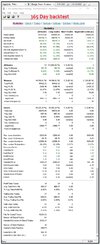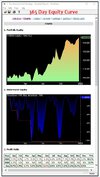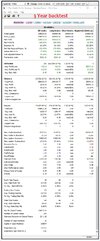- Joined
- 28 December 2013
- Posts
- 6,401
- Reactions
- 24,351
Ann,
Great analysis. Not only are traders watching the 200MA, but investors.




Their main objective is to move large amounts in & out of the markets without shifting the price.
1. I'd agree that interest rates didn't cause the 2000, 2008 or 2020 bear markets (sorry - I've never liked the word 'crash'). However, I'd also say it is possible that interest rates could indirectly cause a bear market.
2. We've lived through a time of seemingly ever reducing rates (but I for one can remember having a home loan at 13%!) so having ridden the elevator to the basement there is only one way for rates to go. Rising rates dampen consumer confidence and impact company profits (which filters through to the share price).
3. Central banks have always been able to influence rates by reducing the cash rate, but that won't work any more and I'm not sure they can stop rates from rising, pushing up inflation and scaring the beejeezus out of investors.
4. Rising interest rates also result in investors moving cash from equities to other investments.
5. Australia is one of the most personally indebted nations in the world where many have borrowed to the hilt. When rates were say 5% and moved up to say 6% it would see a 20% increase in interest repayment (which is pretty massive) but with loans of say 2% rising by the same 1% means a 50% increase in interest payments and a pretty massive flow on to inflation and mortgage distress.
6. That said, I think we'd need a confluence of negative events to see a bear market and interest rates (which go hand in hand with inflation) might be just one of the contributory factors. Unless something major happens - like China having a brain snap and invading Taiwan or Russia invading Ukraine, I'm still favouring a correction rather than a bear market.
Nope--not that simplistic. You omitted the fact that there was also a coinciding broad-based fall in the value of the underlying assets which made the prospect of refinancing very difficult. That coupled with the fact that people could pretty much just walk away from their liabilities resulted in the large defaults that triggered everything else.
There was so much more to it than just these reasons. The whole bond package was a ruse and the sad thing is it still goes on today.
If anyone is interested in reading a wonderful book that offers the best and clearest explanation of exactly what happened leading up to 2007/8 I can highly recommend https://www.amazon.com.au/Colossal-Failure-Common-Sense-Collapse/dp/0307588343
Because they were over cooked—it was a bubble. There was some extremely dodgy valuation practices going on back then.Why did the assets fall?
Because when yields rise, prices (market values) fall.
Due to the margin involved in purchasing bonds (Hedge Funds pay 5%, ie.95% margin) a very small contraction = large move in equity. Banks have even higher margin. They were not 'supposed' to eat their own cooking and hold inventory, but they did, hence big problems.
The root cause: rising interest rates.
jog on
duc
Because they were over cooked—it was a bubble. There was some extremely dodgy valuation practices going on back then.
root cause: over valued underlying flakey mortgage backed assets
Mortgages are valued on interest rates….hmmm. Isn’t it the mortgaged asset that determines the value not interest rates? You’re also overlooking that value also factors in risk—those US sub prime mortgage back assets hid all of that riskAnd 'mortgages' are valued on interest rates.
jog on
duc
I was thinking interest cover can also affect interest rate borrowing? Ducati is deep....interesting thread to learn....too much water causes flooding, too much QE causes inflation....lower interest rates to curb inflation....withdrawl of tapering will cause rise in interest rates (that's what I understand from these discussions) but on the whole I don't think rise in interest rates cause crashes, in my opinion, it's the fear of rising interest rates that causes volatililty.........but please don't donk me on the head if I've got it wrongAnd 'mortgages' are valued on interest rates.
jog on
duc
1. Mortgages are valued on interest rates….hmmm. Isn’t it the mortgaged asset that determines the value not interest rates?
2. You’re also overlooking that value also factors in risk—those US sub prime mortgage back assets hid all of that risk
1. I was thinking interest cover can also affect interest rate borrowing?
2. Ducati is deep....interesting thread to learn....too much water causes flooding, too much QE causes inflation....HIGHER interest rates to curb inflation....withdrawl of tapering will cause rise in interest rates (that's what I understand from these discussions) but on the whole I don't think rise in interest rates cause crashes,
3. in my opinion, it's the fear of rising interest rates that causes volatililty.........but please don't donk me on the head if I've got it wrong
Eskys, you can only edit the post for a limited time after posting.Hi ducati, I made a mistake there, I meant to say tapering or tapering of QE will cause rise in interest rates, not sure how to edit my post (got to explore that)
The more I think about this subject, the more confused I've become.....think I better stick to home economics and my simplistic way of navigating lifeEskys, you can only edit the post for a limited time after posting.
Error and typos happen.no drama
On major issues, you can ask for your post to be deleted..but will go via administrators so please use sparsely and think if it is worth their time
Hi ducati, I made a mistake there, I meant to say tapering or tapering of QE will cause rise in interest rates, not sure how to edit my post (got to explore that)
Don't let this type of common human big fingers typo error or our brain racing off with our thoughts faster than our fingers can type causing spelling error or a word or two missing in the sentence or before we can preview our message, the finger hit the post key.The more I think about this subject, the more confused I've become.....think I better stick to home economics and my simplistic way of navigating life
So, higher interest rates to curb spending, hence prevent inflation? When I say spending, I mean, people going out and buying, eg over inflated stuff? Real estate for example? Is that why that Commsec tweets about real estate growth prediction? My brain is working over time now.....Dow red last night, good luck, everyone
We use cookies and similar technologies for the following purposes:
Do you accept cookies and these technologies?
We use cookies and similar technologies for the following purposes:
Do you accept cookies and these technologies?
